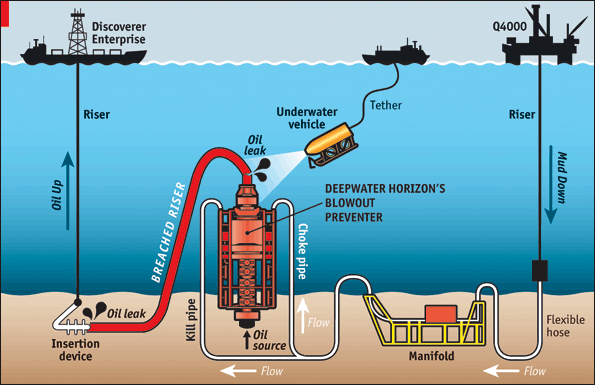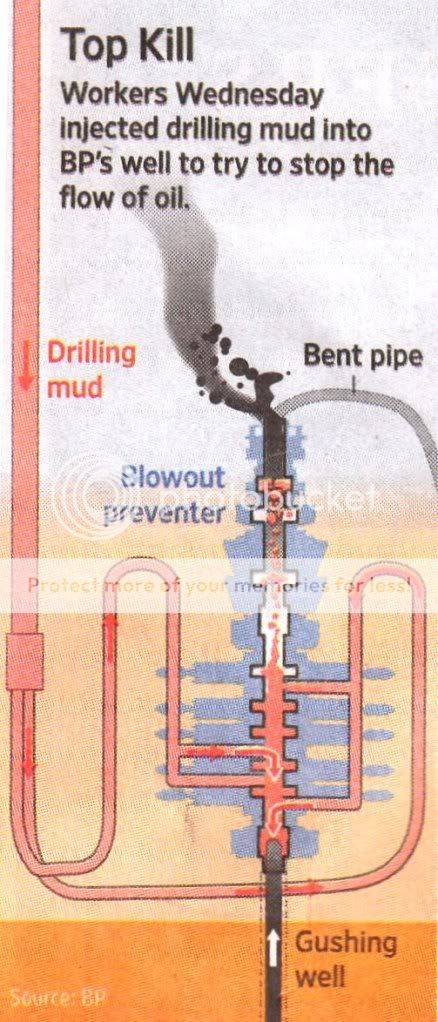Science & Technology.
The Gulf oil spill
What lies beneath
New and valuable lessons are being learnt from the massive operation to stop the Deepwater Horizon oil spill
May 20th 2010 | From The Economist print edition
IT IS not the invasion of Normandy, but by peacetime standards the flotilla stationed about 65km (40 miles) off the Louisiana coast is a mightily impressive one. Where once the ill-fated Deepwater Horizon drilling rig floated in solitary splendour, there are now two similar rigs, along with the Discoverer Enterprise, a drilling ship; the Viking Poseidon, which knows how to install things on the sea floor; four mother ships for remotely operated underwater vehicles; various barges and supply vessels; and the Q4000, a rig that specialises in repairing and closing wells. If the well that the Deepwater Horizon was in the process of closing off four weeks ago continues to spray oil into the sea for months to come, it wont be for a lack of expensive, sophisticated and improbable-looking hardware a mile up above it.
It is that mile which is the problem. The oil industry has been fixing blowouts for more than a century. The challenge is doing it under 150 atmospheres of pressure with the tools and lights of a robot mini-submarine that gets its power and instructions by way of a cable. Under these conditions well-laid plans can come to naught, as they did when icy methane hydrates that form when natural gas gets mixed up with cold water at high pressure scuppered plans to funnel the leaking oil up to Discoverer Enterprise. The hydrates did not just clog the pipes, they also buoyed up the 125-tonne cofferdam that had been lowered over the leak, lifting it right off the sea bed.
On May 16th, though, oil did start to be collected, thanks to a subtler intervention. Oil is currently escaping from two leaks, one at each end of the wells riser. The riser connected Deepwater Horizon to its blowout preventer, a stack of valves on the sea floor which marked the top of the well proper (see illustration). When the rig sank, the riser broke near the top while remaining attached to the blowout preventer at the bottom, bending itself like a pretzel in its subsequent collapse. Some oil is now flowing from where the riser and the blowout preventer meet; most is coming from the broken end of the riser, which has ended up about 300 metres away on the sea floor. It is from a tube slipped into that distal end that oil is now being pumped up to Discoverer Enterprise and its attendant barges.

The insertion device, about a fifth of the diameter of the riser itself, is not supposed to block the flow of oil completely. If it did, the pressure of the oil would blow it out of the riser like a cork in a hose. Instead it sucks at the oil flowing around it, but gauging how hard to suck is tricky. Without enough suction more oil than necessary would continue to leak out; too much and it will let in water which will make the formation of those pesky hydrates more likely. Other anti-hydrate measures include a small pipe feeding methanol, an antifreeze, into the maw of the riser, and hot water circulating through a sleeve to warm the pipe bringing the oil to the surface. According to Kent Wells, vice-president of BP, the oil company in overall charge of the project, the amount of oil coming up through the pipe had risen to 2,000 barrels a day by May 17th.
What fraction of the whole that represents is unclear. The American government has estimated that about 5,000 barrels a day are pouring out of the well. Other analysts reckon the flow rate may be five or ten times higher, on the basis of video images from mini-submarines and the area and thickness of the slicks at the surface. A well might produce 50,000 barrels a day. BP is keeping mum, but it does say that the plume of leaking oil looks significantly different now that suction is being applied. That suggests 2,000 barrels a day is a noticeable fraction of the whole.
The Gulf oil spill: What lies beneath | The Economist
excellent article on the oil spill.
The Gulf oil spill
What lies beneath
New and valuable lessons are being learnt from the massive operation to stop the Deepwater Horizon oil spill
May 20th 2010 | From The Economist print edition
IT IS not the invasion of Normandy, but by peacetime standards the flotilla stationed about 65km (40 miles) off the Louisiana coast is a mightily impressive one. Where once the ill-fated Deepwater Horizon drilling rig floated in solitary splendour, there are now two similar rigs, along with the Discoverer Enterprise, a drilling ship; the Viking Poseidon, which knows how to install things on the sea floor; four mother ships for remotely operated underwater vehicles; various barges and supply vessels; and the Q4000, a rig that specialises in repairing and closing wells. If the well that the Deepwater Horizon was in the process of closing off four weeks ago continues to spray oil into the sea for months to come, it wont be for a lack of expensive, sophisticated and improbable-looking hardware a mile up above it.
It is that mile which is the problem. The oil industry has been fixing blowouts for more than a century. The challenge is doing it under 150 atmospheres of pressure with the tools and lights of a robot mini-submarine that gets its power and instructions by way of a cable. Under these conditions well-laid plans can come to naught, as they did when icy methane hydrates that form when natural gas gets mixed up with cold water at high pressure scuppered plans to funnel the leaking oil up to Discoverer Enterprise. The hydrates did not just clog the pipes, they also buoyed up the 125-tonne cofferdam that had been lowered over the leak, lifting it right off the sea bed.
On May 16th, though, oil did start to be collected, thanks to a subtler intervention. Oil is currently escaping from two leaks, one at each end of the wells riser. The riser connected Deepwater Horizon to its blowout preventer, a stack of valves on the sea floor which marked the top of the well proper (see illustration). When the rig sank, the riser broke near the top while remaining attached to the blowout preventer at the bottom, bending itself like a pretzel in its subsequent collapse. Some oil is now flowing from where the riser and the blowout preventer meet; most is coming from the broken end of the riser, which has ended up about 300 metres away on the sea floor. It is from a tube slipped into that distal end that oil is now being pumped up to Discoverer Enterprise and its attendant barges.

The insertion device, about a fifth of the diameter of the riser itself, is not supposed to block the flow of oil completely. If it did, the pressure of the oil would blow it out of the riser like a cork in a hose. Instead it sucks at the oil flowing around it, but gauging how hard to suck is tricky. Without enough suction more oil than necessary would continue to leak out; too much and it will let in water which will make the formation of those pesky hydrates more likely. Other anti-hydrate measures include a small pipe feeding methanol, an antifreeze, into the maw of the riser, and hot water circulating through a sleeve to warm the pipe bringing the oil to the surface. According to Kent Wells, vice-president of BP, the oil company in overall charge of the project, the amount of oil coming up through the pipe had risen to 2,000 barrels a day by May 17th.
What fraction of the whole that represents is unclear. The American government has estimated that about 5,000 barrels a day are pouring out of the well. Other analysts reckon the flow rate may be five or ten times higher, on the basis of video images from mini-submarines and the area and thickness of the slicks at the surface. A well might produce 50,000 barrels a day. BP is keeping mum, but it does say that the plume of leaking oil looks significantly different now that suction is being applied. That suggests 2,000 barrels a day is a noticeable fraction of the whole.
The Gulf oil spill: What lies beneath | The Economist
excellent article on the oil spill.

